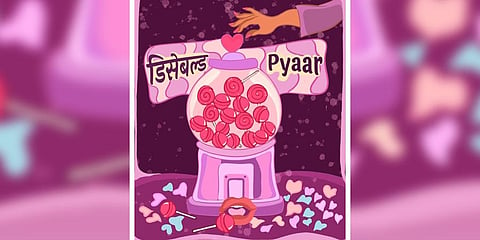

CHENNAI: Imagine a subversion of the classic depiction of Venus - the goddess of love, desire, and sex - reclining on a bed. What would you change about that image? Make the woman look Indian? Picture her as plus-sized? Perhaps add clothes?
Revival Disability Magazine, as part of their Cripplentines Week celebrations, prefers to feature a disabled person in the titular role instead. The Venuses here are queer and disabled folk who are busy reclaiming love, sex, desire, and intimacy for themselves, from able-bodied heteronormative representations.
And so there are stories - of love between queer disabled friends, love for an ex-partner, an aromantic-asexual autistic person who dreams of fashioning their own rules and labels for relationships.
Cripplentines is rooted in the belief that all kinds of love should be celebrated, says Nu, a Gender Studies student and Revival's founder and editor-in-chief. Using the term 'Cripplentines' too is a form of re-defining the word crippled without the stigma attached.
"Why are we as disabled folk always expected to 'fall in love' and tell the able-bodied world inspiring tales of 'if we can be in loving relationships, so can you!'", Nu declares.
Disabled agency
The Revival Disability Project's Instagram page is a riot of colour, celebration, illustrations, reels, and visual narratives. The narratives are not saccharine or maudlin, as is wont in a world that either infantilises, sexualises or patronises persons with disabilities and those with chronic and mental illnesses, even overlooking their sexuality.
These intimate first-person accounts are affirming and true-to-life, featuring expressions of desire, disabled sexuality, sadness, frustration, anger, vulnerability, anxiety, and loneliness. In the words of Nu, "What consists of an 'ideal' disabled person? Why do we have to be happy and motivated all the time? Why can’t we be sad, angry, unmotivated and depressed? Why do others have to decide our identity and take our decisions when our identity and agency belongs to no one but us?"
Defining love for self
The project has had many effects on the people it brought to the fore as well. For Swara, who is autistic, it has been close to cathartic. "I always thought Valentine’s Day was about having love for partners, or friends and family. After writing a first-person narrative for Cripplentines Week, I realised that self-love is love, too. I didn't think that my writing about self-love could even be applicable initially because of the whole stereotype of us not having any experience of love. I also swayed my body to a song for an Instagram reel and used my guitar. Music always makes me happy," she shares.
Swara emphasises on disabled people accepting themselves as a form of self-love. "Self-love is about loving yourself, being confident, having some self-esteem to face the world with the pain and hatred that comes your way. And if you find people who accept you for who you are, we shouldn't stop them from coming to us," she suggests.
Creating depictions that resonate
Speaking about their deep, personal experiences that led to the idea and creation of Revival, which is both a magazine and an affirmative support system, during the 2020 lockdown, Nu shares that their objective was to ‘un-hide’ disability.
"I didn’t like wearing dresses when I walked with my crutch because I had this idea of 'femininity' ingrained in me by patriarchy that was against my identity as a disabled woman. I grew up in a body that I loathed, among able-bodied structures of independence, productivity, achievements, enjoyment, childhood splendour and wonder. There was (still is) a certain invisibility in the air that contributed to the erasure of and to the gross ignorance about disabled bodies, especially bodies of disabled women, trans and non-binary folks. Two years later, I am becoming more and more of my queer disabled self every day. I called it 'Revival' because it was like my own revival after a lifetime (well, 22 years) of hiding myself and my identity," she says.
Co-editor and lawyer Sam talks about the importance of having intersectional narratives. "Nu and I have felt that our disabilities have prevented us from relating to traditional and abled portrayals of love and romance. Hence, we want to invite and create as many depictions of disabilities and sexualities to make it relatable to as many people as possible," she elaborates.
It is the best feeling in the world for a creator to know that people could see glimpses of themselves in the Cripplentines narratives and find solidarity and resonance, shares Sam. "People told us that they could see their problems, struggles, and some solutions too, in them," she adds.
True to the spirit of a people-powered digital art project, there are no barriers for self-expression in these narratives, no limiting definitions of what 'art' is, no finite ways of loving and being - just a boundless explosion of disabled joy and dissent.
"Is only physical protest valid as a form of dissent? Most of us are chronically ill, physically or mentally, and - on some days - cannot get out of bed. So, we dissent by writing poetry, painting with our disabled fingers, speaking a disabled language, walking in a disabled way - just by existing. Every day is a protest, a fight for us. Our existence is a rebellion. You can walk, limp, wheel into a revolution!" she asserts.
Inclusive stories
The Revival Disability Project's Instagram page is a riot of colour, celebration, and visual narratives. The intimate first-person accounts are affirming and true-to-life, featuring expressions of desire, disabled sexuality, sadness, frustration, anger, vulnerability, anxiety, and loneliness.
Disabled and queer folks can send in their contributions to Cripplentines to @revivaldisabilitymag on Instagram.